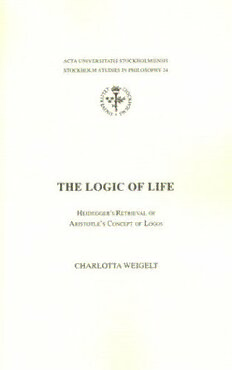
Logic of Life: Heidegger's Retrieval of Aristotle's Concept of Logos PDF
124 Pages·2002·60.909 MB·English
Most books are stored in the elastic cloud where traffic is expensive. For this reason, we have a limit on daily download.
Preview Logic of Life: Heidegger's Retrieval of Aristotle's Concept of Logos
Description:
This is a Ph.D. Dissertation. In the work of Martin Heidegger, the quest for the proper philosophical beginning is motivated by an awareness of the "historical" nature of thought: its dependency upon the beginning of philosophy in the historical sense. This study explores Heidegger's early attempt to provide philosophy with a new beginning by explicitly addressing the legacy of Aristotle, regarded as the philosophical origin, which philosophy cannot avoid confronting without remaining na?ve with respect to its own foundation. Heidegger's project is considered here with respect to how it conceives of the question of human reason, and it is taken to be driven by ambition to come to grips with a traditional logical and theoretical ideal of cognition. Turning to Aristotle as the alleged originator of this ideal, Heidegger focuses on the concept of logos, taking as his point of departure Aristotle's classical definition of man as zoion logon echon, commonly rendered as "the rational animal". The study explores Heidegger's retrieval of Aristotle's concept of logos. In this pursuit, Heidegger is guided by the assumption that this concept must be traced back to Aristotle's understanding of life and praxis, since it is based upon an experience of speech as the basic trait of human cognition. It is shown how Heidegger on the basis of his interpretation of Aristotle tries to develop a notion of a speaking or discursive reason. Thereby, he hopes to overcome an idea also present in Aristotle: that the supreme form of knowledge is contained in the simple apprehension of nous. It is argued that the point is revealing the "practical" foundation of Aristotle's notion of logos is situated within the context of Heidegger's interpretation of Aristotle's teleology. A guiding assumption is that Heidegger thinks that the concept of kinesis, change, provides us with the ontological background to Aristotle's inquiry into logos. It is shown how Heidegger argues that Aristotle was not able to fully affirm this because of his assumption that being in the true sense is not kinesis but entelecheia, unchanging, complete activity, which belongs not to logos but to nous.
See more
The list of books you might like
Most books are stored in the elastic cloud where traffic is expensive. For this reason, we have a limit on daily download.
